Intel Core i7-7820X Skylake-X Review
Why you can trust Tom's Hardware
VRMark, 3DMark & AotS: Escalation
VRMark & 3DMark
We aren't big fans of using synthetic benchmarks to measure game performance, but 3DMark's DX11 and DX12 CPU tests provide useful insight into the amount of raw horsepower available to the game engine.
Futuremark's VRMark test lets you gauge your system's suitability for use with the HTC Vive or Oculus Rift, even if you don't currently own an HMD. The Orange Room test is based on the suggested system requirements for current-generation HTC Vive and Oculus Rift HMDs. Futuremark defines a passing score as anything above 109 FPS.
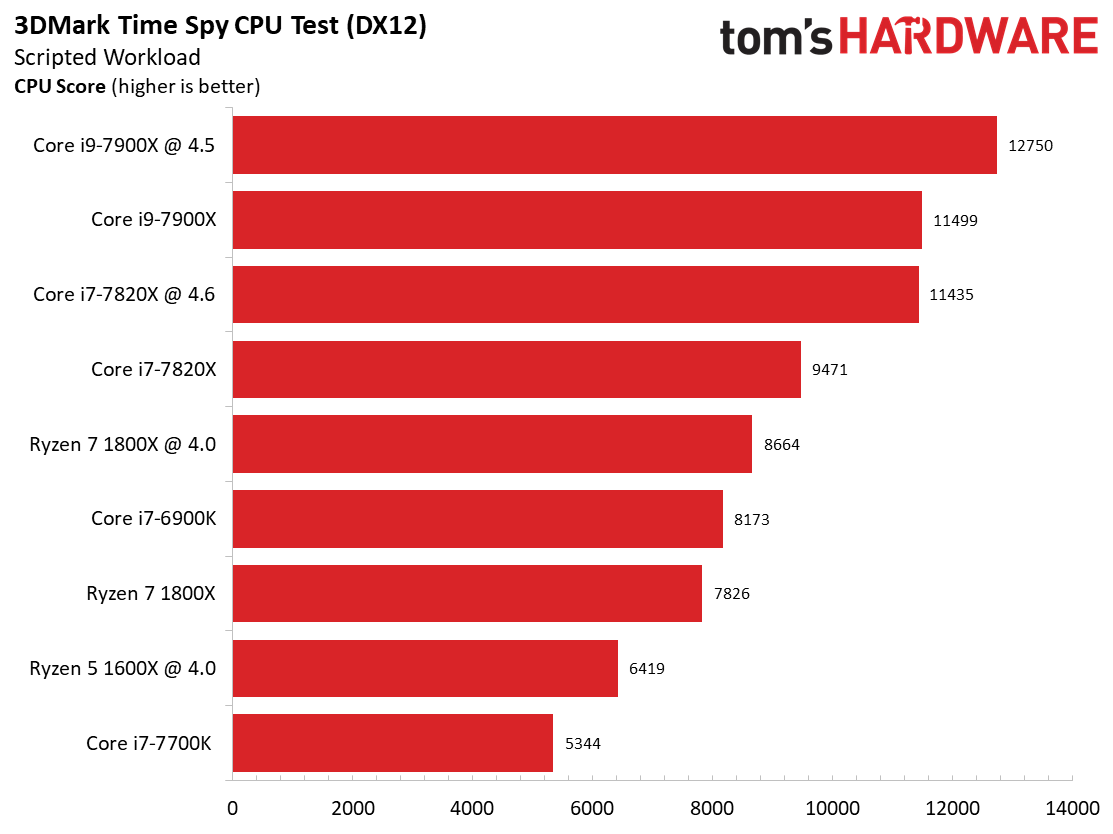
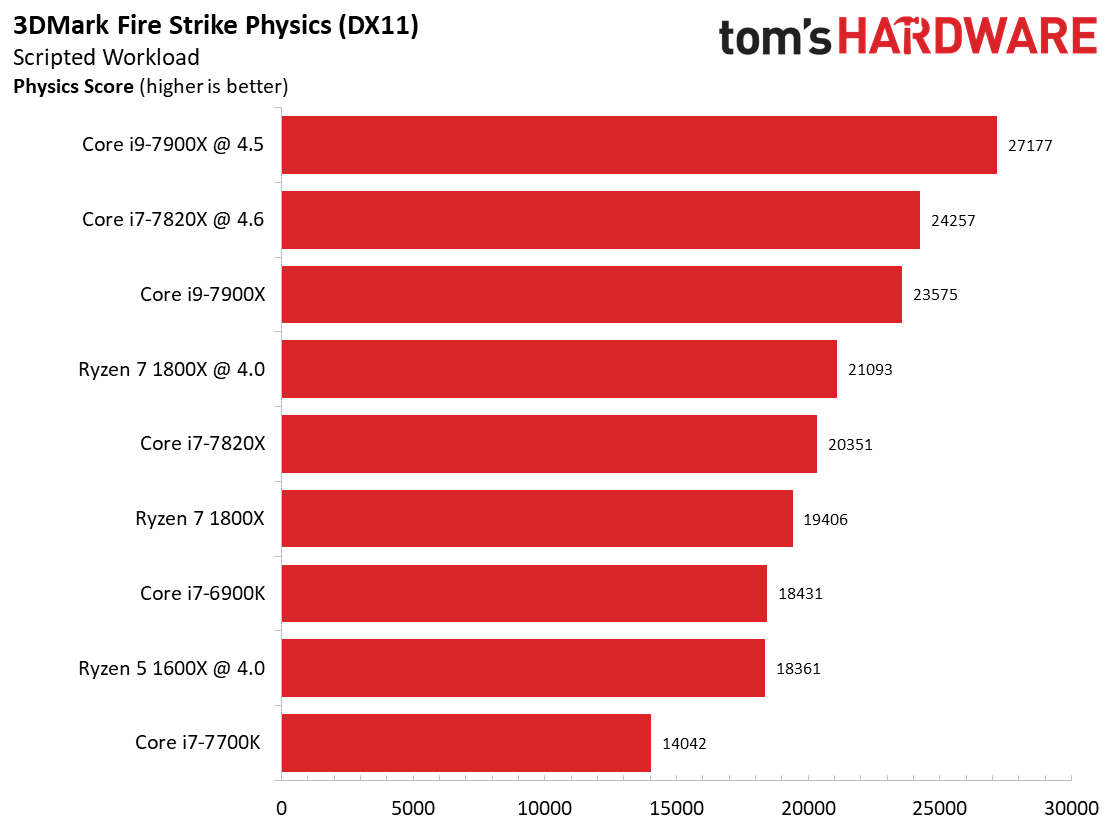
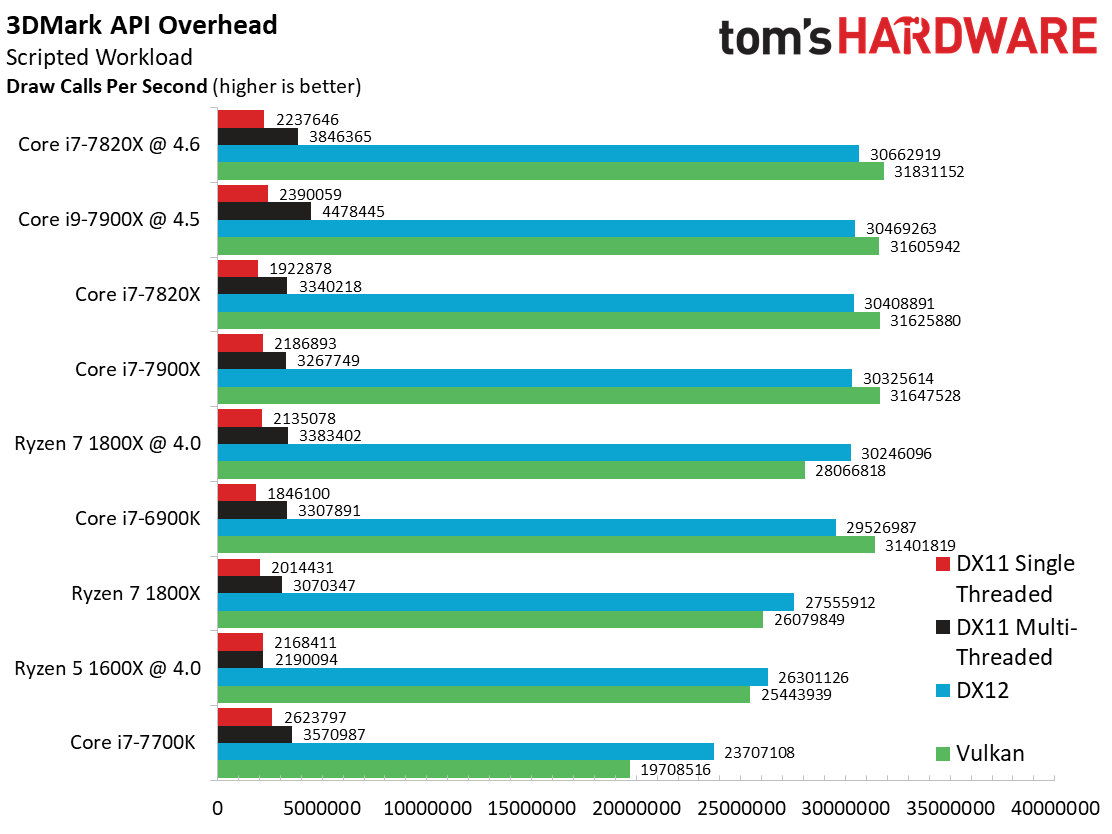
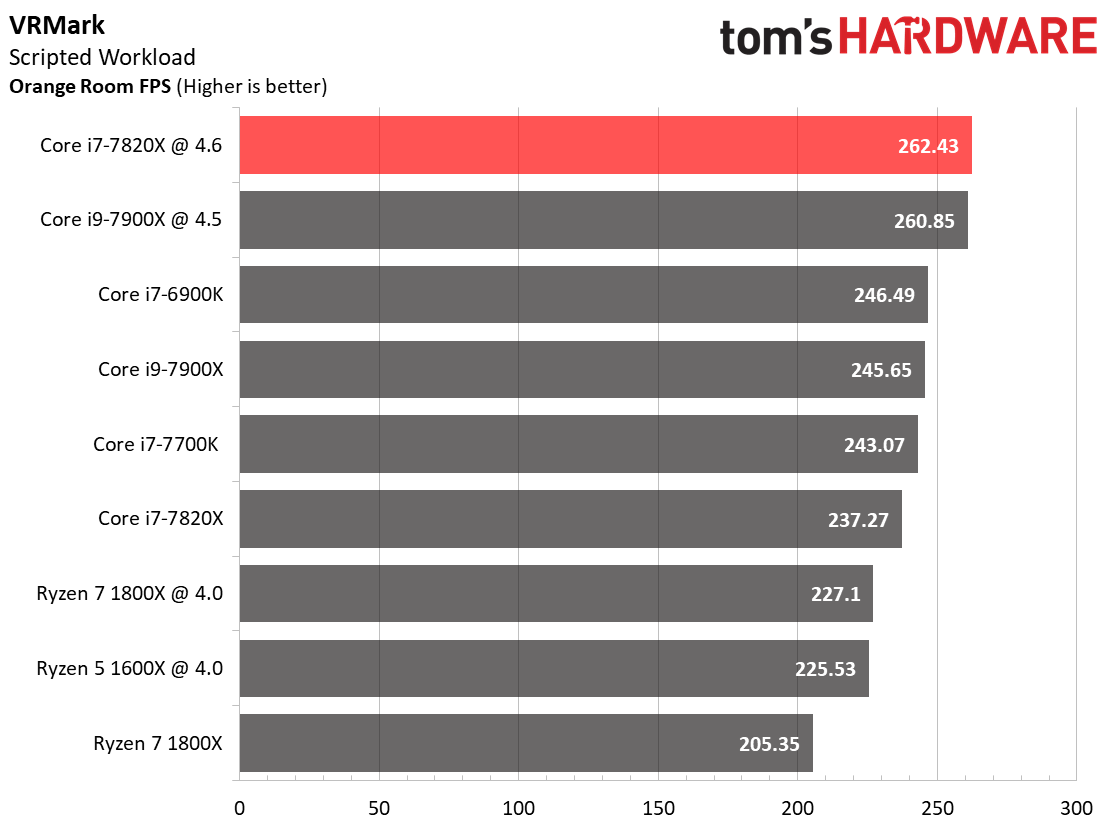
The VR test rewards a mixture of per-core performance and parallelism, so the tuned -7820X carves out a small lead over the Core i9-7900X due to its better overclock.
Conversely, the heavily-threaded CPU and physics tests score higher on a 10-core -7900X. The Ryzen processors fare well in metrics optimized for parallelism, but Skylake-X's higher performance per clock cycle goes unmatched.
Core i7-7820X has a higher base and overclocked frequency than the -7900X, which helps explain its performance advantage in the API tests. However, a few extra frequency bins shouldn't overshadow the -7900X's extra cores in our threaded DX12 and Vulkan tests. Perhaps fewer cores generating traffic across the mesh is a good thing in latency-sensitive workloads?
Ashes of the Singularity: Escalation
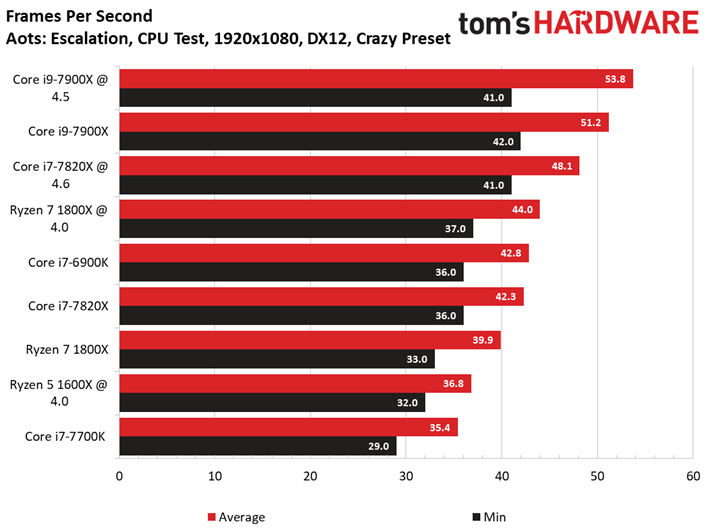
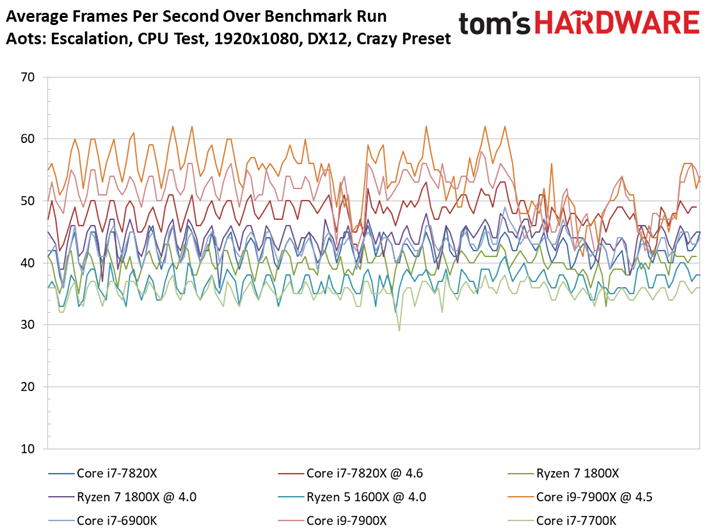
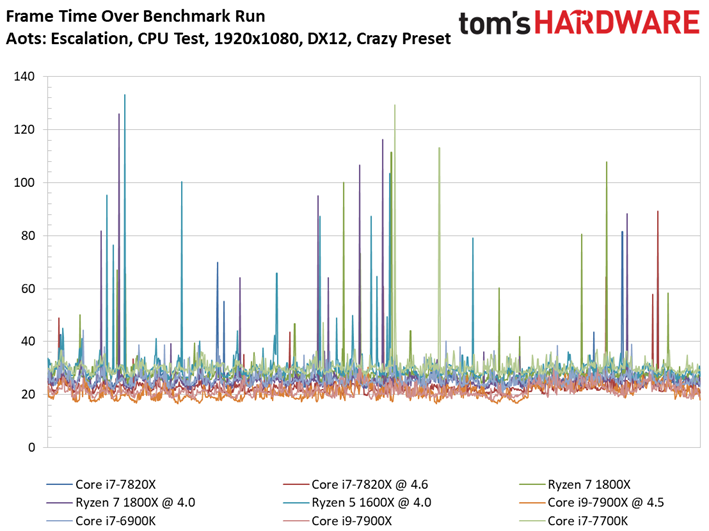
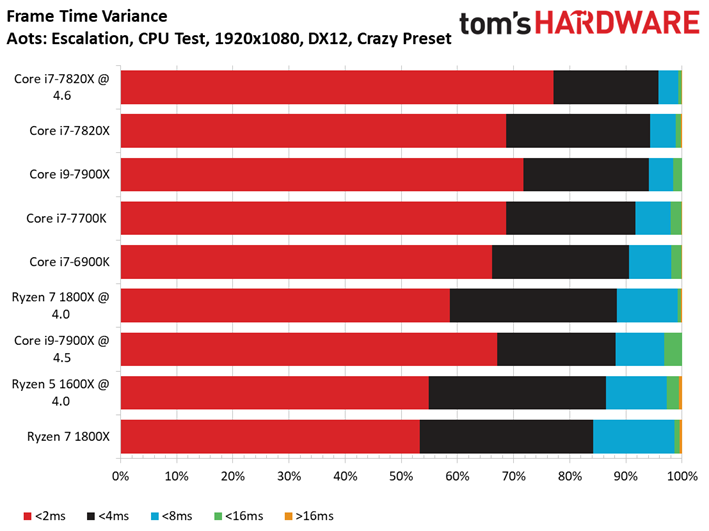
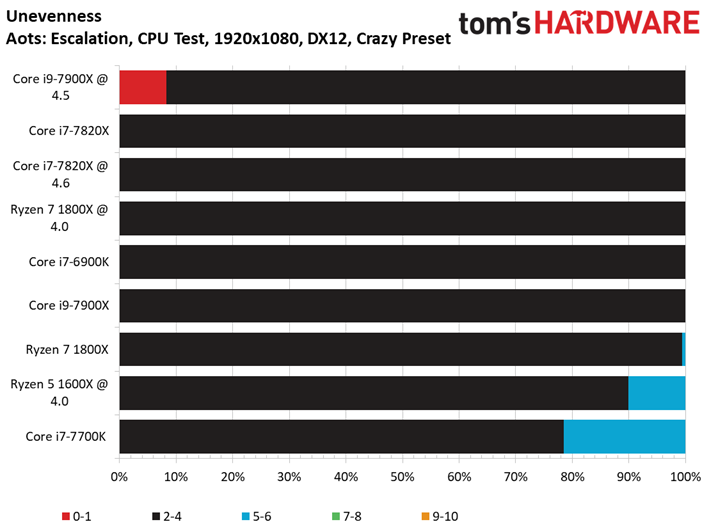
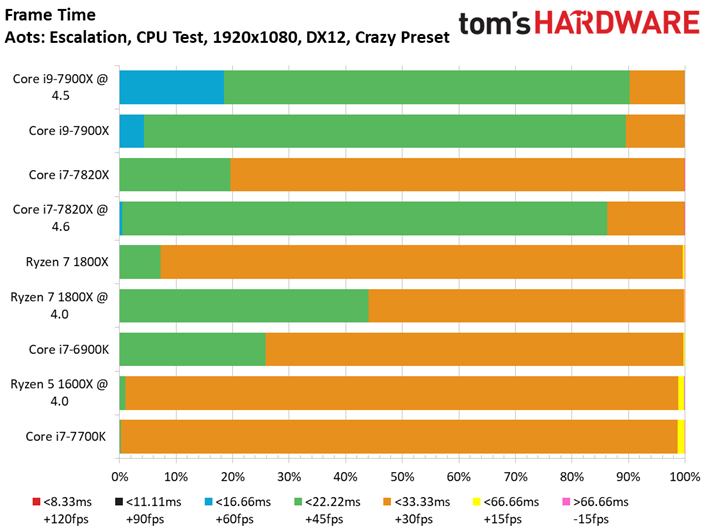
Ashes of the Singularity: Escalation scales exceedingly well with core count, so the Core i7-7820X trails Intel's -7900X in our results.
The Ryzen processors still can't overtake Skylake-X. However, they do dispatch Core i7-7700K with relative ease. This Kaby Lake-based chip is similar to Core i7-7740X, which Intel inexplicably shoehorned into X299 alongside our Skylake-X models. Because the -7740X makes so little sense, we're focusing our comparison on the more popular -7700K.
Get Tom's Hardware's best news and in-depth reviews, straight to your inbox.
MORE: Best CPUs
MORE: Intel & AMD Processor Hierarchy
MORE: All CPUs Content
Current page: VRMark, 3DMark & AotS: Escalation
Prev Page Test Setup & Overclocking Next Page Civilization VI & Battlefield 1
Paul Alcorn is the Editor-in-Chief for Tom's Hardware US. He also writes news and reviews on CPUs, storage, and enterprise hardware.
-
cknobman Just want to say the Ryzen 7 1800x isnt $500 anymore and has not been for weeks now.Reply
The processor is selling for $420 or less. Heck I bought mine yesterday from Fry's for $393 -
artk2219 Reply19984543 said:Just want to say the Ryzen 7 1800x isnt $500 anymore and has not been for weeks now.
The processor is selling for $420 or less. Heck I bought mine yesterday from Fry's for $393
Not to mention the fact that you can find the 1700 for even less, and more than likely be able to bump the clocks to atleast match the 1800x. Microcenter was selling them for 269.99 last week. -
Ne0Wolf7 At least they've done something, but it still too expensive to sway me.Reply
Perhaps full blown profesionals who need something a bit better than what Ryzen has right now but can go for an i9 would appreciate this, but even hen he/she/it would probably wait to see what threadripper had to offer. -
Scorpionking20 So many years past, I can't wrap my head around this. Competition in the CPU space? WTH is this?Reply -
Houston_83 I think the article has some incorrect information on the first page.Reply
"However, you do have to tolerate a "mere" 28 lanes of PCIe 3.0. Last generation, Core i7-6850K in roughly the same price range gave you 40 lanes, so we consider the drop to 28 a regression. Granted, AMD only exposes 16 lanes with Ryzen 7, so Intel does end the PCIe comparison ahead."
Doesn't Ryzen have 24 lanes? Still under intel but I'm pretty sure there's more than 16 lanes. -
artk2219 Reply19984718 said:I think the article has some incorrect information on the first page.
"However, you do have to tolerate a "mere" 28 lanes of PCIe 3.0. Last generation, Core i7-6850K in roughly the same price range gave you 40 lanes, so we consider the drop to 28 a regression. Granted, AMD only exposes 16 lanes with Ryzen 7, so Intel does end the PCIe comparison ahead."
Doesn't Ryzen have 24 lanes? Still under intel but I'm pretty sure there's more than 16 lanes.
Ryzen does have 24 lanes, but only 16 are usable, 8 are dedicated to chipset and storage needs. -
JimmiG Reply19984740 said:19984718 said:I think the article has some incorrect information on the first page.
"However, you do have to tolerate a "mere" 28 lanes of PCIe 3.0. Last generation, Core i7-6850K in roughly the same price range gave you 40 lanes, so we consider the drop to 28 a regression. Granted, AMD only exposes 16 lanes with Ryzen 7, so Intel does end the PCIe comparison ahead."
Doesn't Ryzen have 24 lanes? Still under intel but I'm pretty sure there's more than 16 lanes.
It does, but only 16 are usable, 8 are used for chipset and storage needs.
16X are available for graphics as 1x16 or 2x8.
4X dedicated for M.2
4X for the chipset that's split into 8x PCI-E v2 by the X370 and allocated dynamically IIRC -
Zifm0nster Would love to give this a chip a spin.... but availability has been zero.... even a month after release.Reply
I actually do have work application which can utilize the multi-core. -
Math Geek does look like intel was caught off guard by amd this time around.Reply
will take em a couple quarters to figure out what to do. but i'm loving the price/performance amd has brought to the table and know intel will have no choice but to cut prices.
this is always good for the buyers :D -
Amdlova Why we have overclocked cpus ons bench but dont have power compsumation! this review is biased to intel again !? are tomshardware fake news ?Reply